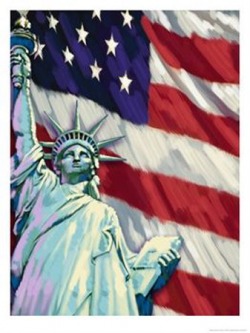The Paradoxes of American Government
The Power of Government vs. The Power of the People
Powerful political institutions are in place to make up for the shortcomings of the people and public institutions, however as public participation continues to decline and America experiences a lack of strong leadership in society, they tend to do more harm than good. With the public holding the government less and less accountable as history progresses, these powerful political institutions become too powerful (as I will talk about in ABUSE OF POWER), giving the elite too much power and placing too much influence into the hands of large corporations.
Presidential Elections
-Since the 1960’s voter participation has slowly and steadily started to decline.
-Once above 60% (63.1), only 55.3% of the voting-age population delivered a decision in the 2004 elections.
-In almost every presidential election since the 60’s, turn out has decreased by a few or more percentage points with the exception of the 1992 election where turn out increased from 50% to 55%
-The next election however in 1996 rendered an even lower turn out than the 1988 election with only 49.1% turn out.
Midterm Elections
-Voter turn out in elections that determine our representatives apart from our president is overall lower than turn out in presidential elections, but is getting close to being at the same percentage as it was in 1962.
-Between 1962 and 1990, voter turn out in these elections slowly decreased from 47.3% to 36.5%
-Since 1994 however, voter turn out has begun increasing and in 2006 voter turn out was at 43.6%
My conclusion? Government becomes too powerful when power shifts from the people to the large institutions and corporations. The reason why the power is able to shift is because the people put less of an emphasis on accountability within government and fewer people are participating in our democracy. While activity in Washington has steadily increased, activity on main street has decreased substantially. Lobbyists spend billions of dollars each year lobbying congress on multiple fronts and there are organizations representing almost every interest group one can think of. Congress seems incapable of passing any sort of significant legislation and people become disenfranchised from the entire process.
Liberty vs. Order
The constitution sets forth the idea that liberty comes in many forms such as:
-The freedom to speak
-The freedom to assemble
-The freedom to freely practice one's religion
-The freedom of the press
-The freedom to petition the government for a redress of grievances
In order to maintain a functioning society however, liberty must be balanced with order.
Freedom of Speech: Time, place and manner restrictions prevent public speech that violates other people's rights. However, all regulations must be content-neutral meaning they cannot restrict the content of one's speech.
Freedom of the press: There are very minimal restrictions on the freedom of the press because belief and action are so intertwined. In NY Times v. Sullivan, the courts ruled that even documents that have the potential of defacing a president can be published since the information, no matter how offensive, can help people form ideas. Here the beliefs and actions are so bound together that to prevent it would keep the marketplace of ideas from flowing. In Near v. Minnesota, it was determined that prior restraint is not legal meaning any type of regulation that prevents information from being published is unconstitutional.
Freedom of Religion: It is difficult to prevent somebody from practicing his or her own religion without also violating the establishment clause. When doing so, the courts must prove that there is a compelling state interest of greater importance than the right to freely practice religion. For example, in Smith v. Oregon the use of peyote within the workplace was outlawed because there was a compelling state interest to outlaw drugs that overrides the religious need for the peyote.
HAYAT vs. US: US Attorney General McGregor Scott said "that we can prevent further acts of terrorism by winning convictions against those who would plot deadly acts against our citizens before they can act." Here, Scott is drawing on the precedent of Brandenburg vs. Ohio where it was determined that speech cannot be restricted unless it is bound to spark imminent lawless action. This unearths the continuing debate about where the line between preserving order and sustaining liberty should be drawn.
Sometimes it's easy to separate ones beliefs from the actions they may spark, but in most it is nearly impossible to restrict an action without also limiting the beliefs upon which it was based.

